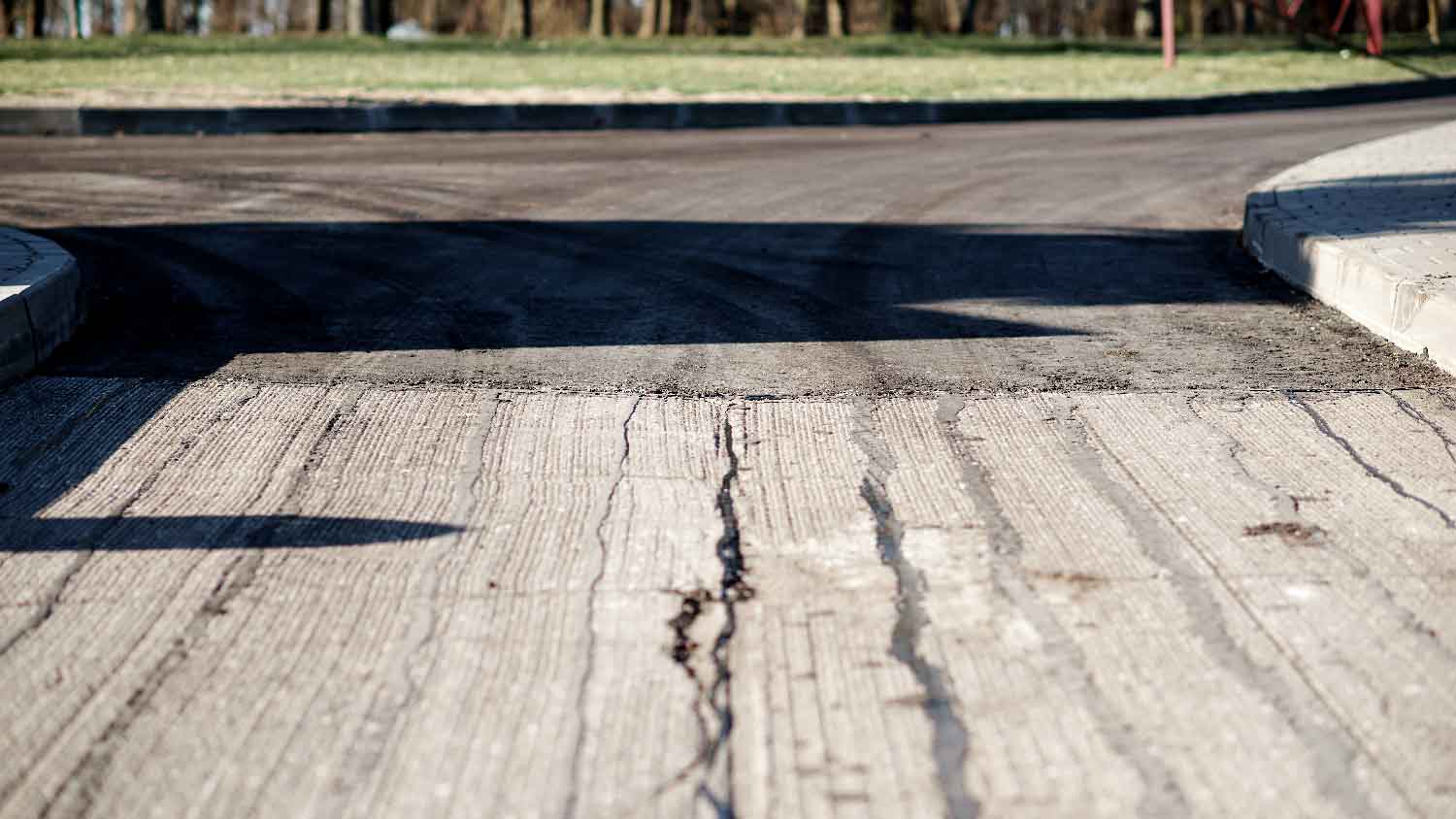
Asphalt driveway repair costs account for everything from hairline cracks to complete overhauls. Learn what to expect from your asphalt repair bill.
Protect your pavement and give cracks the seal of disapproval with these driveway sealants


What you use to seal your driveway matters! Once you've invested in the cost of paving your driveway, you want to make sure you can keep it intact for as long as possible. Different sealers have unique pros and cons that you need to know about. Use this guide to make the right choices for asphalt and concrete.
Your asphalt driveway can easily last up to 30 years if you care for it properly. This includes the essential task of getting it resealed every two to three years. If you've chosen an asphalt driveway because this is a recommended driveway material for cold weather, it will be important to select a sealant that also performs strongly against cold weather and the freeze-thaw cycles that happen in most of the country. Here's your look at top sealant choices for asphalt.
Oil-based driveway sealers create a smooth, glossy finish that many homeowners like. They are also known for creating a flexible finish that can withstand temperature fluctuations. Oil is also a more budget-friendly option compared to water-based sealers. While oil-based sealants were once commonly used, some homeowners now avoid them over worries of volatile organic compounds (VOCs) that can have harmful health and environmental consequences.
Original crack sealer dried out and some cracks reappeared. After a follow-up call, crew came out, re-cleaned drive and resealed cracks with partial overall cover for uniform appearance. Paid attention to details and I'll probably have a second coat applied in a few years with a two coat application. Feel confident in their work as performed. If your car leaks oil, fix the leak. They tried treating surface but spots still visible since oil is soaked into asphalt. Neat joint lines at garage and entry stairs. Great Job!
Asphalt emulsion sealer is considered the modern upgrade from the long-lasting coal tar sealers that were popular in the past. Asphalt emulsion is considered far more eco-friendly and health-friendly compared to the products it has replaced. Homeowners who choose asphalt emulsion appreciate that this option dries "smooth and dark." You'll get a true black instead of the dark gray shade you would get when using tar. That ink-black hue comes from the fact that these sealers consist of asphalt that is blended with small amounts of water and emulsifying agents.
Considered the premium driveway sealant, latex acrylic is a top pick if you want to avoid the need to reseal your driveway often because it offers incredible longevity. Depending on how much wear and tear your driveway undergoes, you'll typically be able to go five to 10 years before sealing it again after applying latex acrylic. Latex acrylic also keeps driveways looking gorgeous for years with the help of its UV-resistant and stain-resistant properties. This is the one to pick if your driveway sees heavy traffic or you park your cars outdoors most of the time.
Of course, the thickness and durability of this option come with a price. In addition to costing as much as two to three times the price of sealants that aren't as durable, latex acrylic can be messy to apply. Factor in the cost of hiring a pro to seal your driveway with latex acrylic if you want to reap all of its benefits by having a proper application.
Once the go-to option for driveway sealing, coal tar sealer is now a controversial choice. Let's start with why so many people have chosen it in the first place. Coal tar sealer creates a dark, shiny finish that leaves a driveway looking like it was just paved. It also creates a hard, shell-like film over a driveway that offers resistance against UV rays, water penetration, and oil seepage. It even stands up nicely against wear and tear from cars.
If you're choosing coal tar sealer, you have to weigh the risks. Tar sealer products have been found to be high in VOCs. In fact, some communities actually ban homeowners from using tar for this reason. However, some homeowners still choose tar because they prefer the benefit of only having to reseal once every five years instead of potentially resealing every two years with some of the more eco-friendly driveway sealers out there.
Water-based sealers have become the go-to alternatives to oil-based and synthetic driveway sealers in recent years. Water-based driveway sealers sold on the market today use water as a base. They also contain limestone and various fillers. One of the most obvious benefits of water-based asphalt sealers is that they are low in VOCs and environmentally friendly. Lack of fumes and easy cleanup help to make water-based driveway sealant one of the only true DIY sealant options. However, the fast-drying nature of water-based sealers does mean that homeowners will need to work quickly in order to properly seal their driveways without visible mistakes. In areas with high rainfall, the breathability of water-based sealants can be a plus because they can help the driveway to absorb water instead of creating pooling.
If you're looking for a completely VOC-free asphalt driveway filler, options are scarce. However, some homeowners do opt for biodegradable sealers made from soy. In general, soy-based sealants create an illustrious black finish that stands up nicely against staining. Soy sealers require reapplication more frequently compared to other options. They also generally cost more.
If you're installing a concrete driveway because of the way this material performs in hotter, dryer weather, you'll need to find a sealant that also withstands these same conditions. This means looking for ingredients that can withstand high temperatures and direct sunlight. Here's a look at the best driveway sealants when you have a concrete driveway.
This is a great choice if you want a shiny concrete driveway. Acrylic's exceptional protection against UV rays makes it a top pick for a concrete driveway that spends a lot of time baking in the hot sun. Acrylic also does a great job of protecting driveways from moisture problems and damage from chemicals. While acrylic is considered durable, its thinner consistency means that you'll need to reapply more frequently than other options. Depending on your driveway usage, that could mean every one to two years. Some homeowners also notice yellowing over time with acrylic.
If you want to waterproof your concrete driveway, epoxy is considered the strongest choice. While epoxy flooring is often used for indoor concrete, homeowners can actually use it on patios, walkways, and driveways. This high-end option is more popular when a homeowner is creating a custom luxury look that also incorporates heated driveway cost. The one downside to note here is that epoxies fade with prolonged exposure to UV rays. Cost can also be a factor. At $40 to $175 per gallon, epoxy can cost double the price compared to other options.
Available in both solvent-based and water-based formulations, polyurethane forms a thick, hard cover that can last up to five years. It is highly resistant to staining from oil and chemicals. If you live in an area with extreme temperatures or heavy rainfall, polyurethane can be a great option because it is highly resistant to cracking or degrading. You can also choose from matte or glossy styles to create the look you want at your home. The fumes and potential for high VOC content with polyurethane sealants should be taken into consideration when choosing between DIY driveway sealing and hiring a professional driveway sealcoating company near you.
From average costs to expert advice, get all the answers you need to get your job done.

Asphalt driveway repair costs account for everything from hairline cracks to complete overhauls. Learn what to expect from your asphalt repair bill.

Calculate the cost of installing a new asphalt driveway based on dimensions, depth, finishes, and other custom driveway details.

The cost of a tar and chip driveway falls between gravel and asphalt. Is this unique process the happy medium you've been looking for? Let's take a look.

Gravel is a versatile material, making it a good choice for driveways. Read this guide to learn more about the best gravel driveway ideas for your home.

This guide gives you an idea of the average cost of asphalt millings for projects of different sizes.

Discover the main differences between pathways, walkways, driveways, and roadways. Learn how each is used, their materials, and where you’ll commonly find each.